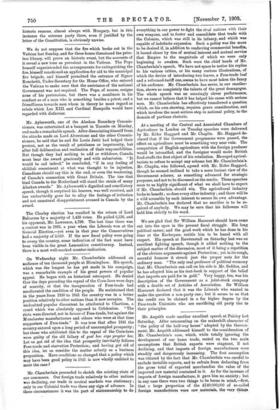Mr. Chamberlain proceeded to sketch the existing state of our
commerce. Our foreign trade relatively to other nations was declining, our trade in neutral markets was stationary ; only in otu- Colonial trade was there any sign of advance. In these circumstances it was the part of statesmanship to do
everything in our power to fight the rival nations with their own weapons, and to foster and consolidate that trade with the Colonies, which was still in its infancy, and which was capable of indefinite expansion. Such a policy was the more to be desired if, in addition to conferring commercial benefits, it bound closer by ties of mutual interest and mutual service that Empire to the magnitude of which we were only beginning to awaken. Such were the chief heads of Mr. Chamberlain's speech. We have not space to notice his replies to his various critics, or his many curious illustrations, _of which the device of introducing two loaves, a Free-trade loaf and a reformed-tariff one, seems to have most taken the fancy of his audience. Mr. Chamberlain has never, in our recollec- tion, shown so completely the talents of the great demagogue. The whole speech was an amazingly clever performance, but we cannot believe that it has helped his cause with serious men. Mr. Chamberlain has effectively transferred a question which, on his own showing, requires grave consideration, and which involves the most serious step in national policy, to the domain of partisan rhetoric.






























































 Previous page
Previous page